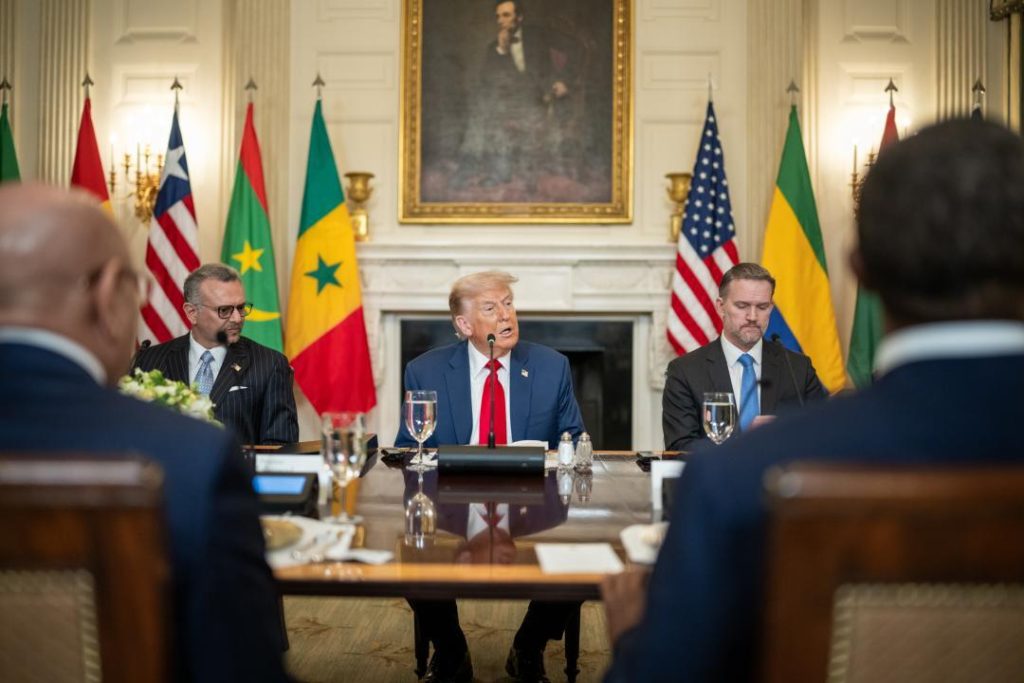
Title: Good English, where did you learn that,’ Trump tells Liberian Prez Boakai; criticised
As the world continues to grapple with the complexities of language and cultural nuances, a recent exchange between US President Donald Trump and Liberian President Joseph Boakai has sparked a heated debate. The incident, which took place during a meeting between the two leaders, saw Trump praising Boakai’s English skills, asking him “Such good English…Where did you learn to speak so beautifully?” The comment, which was met with a mix of amusement and annoyance, has been widely criticized, with many accusing Trump of being racist.
The exchange, which was captured on camera, showed Trump approaching Boakai and making the comment, before following up with “In Liberia? Well, that’s very interesting.” Boakai, seemingly taken aback by the question, smiled and replied “Thank you, Mr. President,” before moving on to discuss other matters.
While Trump’s comment may have been intended as a compliment, it was seen as insensitive and patronizing by many. English is the official language of Liberia, and it is widely spoken throughout the country. Many Liberians, including Boakai, have spoken English as a first language, and it is not uncommon for them to possess excellent language skills.
The criticism of Trump’s comment was swift and widespread. Congresswoman Jasmine Crockett, a Democrat from Texas, took to Twitter to express her disgust, saying “Trump never misses an opportunity to be racist.” She added that the comment was “just another example of his lack of understanding and respect for people of color.”
Other critics pointed out that Trump’s comment was not only insulting but also inaccurate. Liberia, like many other countries, has a complex history of colonization and cultural exchange, which has shaped the language and culture of its people. To suggest that someone’s English skills are unusual or remarkable simply because they are from Liberia is not only ignorant but also disrespectful.
Some have also pointed out that Trump’s comment is part of a larger pattern of behavior, in which he frequently uses language to belittle and diminish others. From his comments about the English language to his attacks on immigrants and people of color, Trump has consistently shown a lack of respect for the diversity and complexity of human language and culture.
Despite the criticism, Trump has yet to apologize for his comment. Instead, he has continued to defend himself, saying that he was simply trying to be friendly and courteous. However, his defenders have also been quick to point out that the comment was meant as a compliment, and that Boakai himself seemed to take it in stride.
While it is true that Boakai did not seem to be offended by Trump’s comment, it is also clear that the comment was not well-received by many others. The incident serves as a reminder of the importance of cultural sensitivity and awareness, and the need for leaders to be mindful of the impact of their words.
As the world continues to become increasingly interconnected, it is crucial that we learn to communicate effectively and respectfully across linguistic and cultural boundaries. Trump’s comment, while well-intentioned, serves as a reminder of the challenges that we still face in this regard.
In conclusion, the exchange between Trump and Boakai highlights the importance of cultural sensitivity and awareness in international diplomacy. While Trump may have meant his comment as a compliment, it was seen as insulting and inaccurate by many. As we move forward, it is crucial that we learn to communicate effectively and respectfully, and that we avoid using language to belittle or diminish others.



